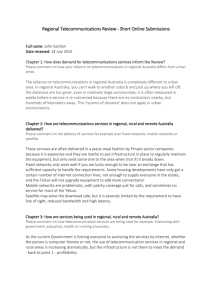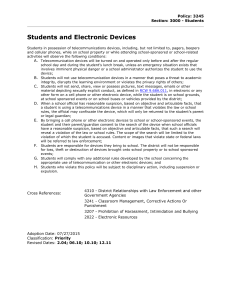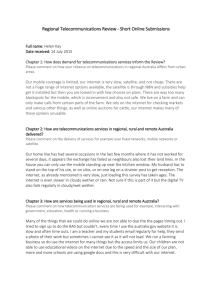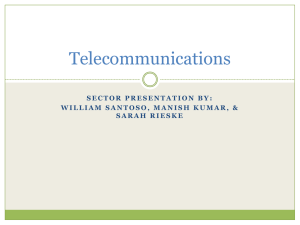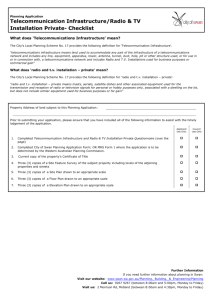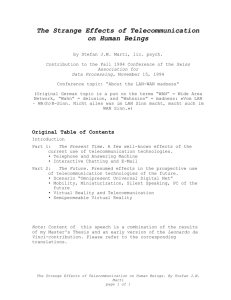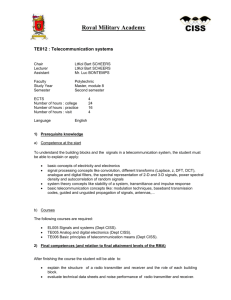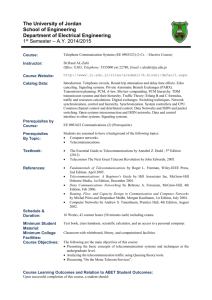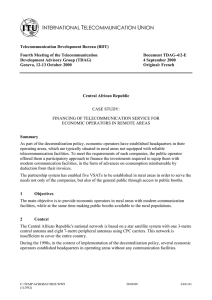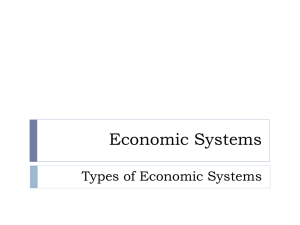Capel, Anne-Louise - Public Submission RTIRC 2015
advertisement
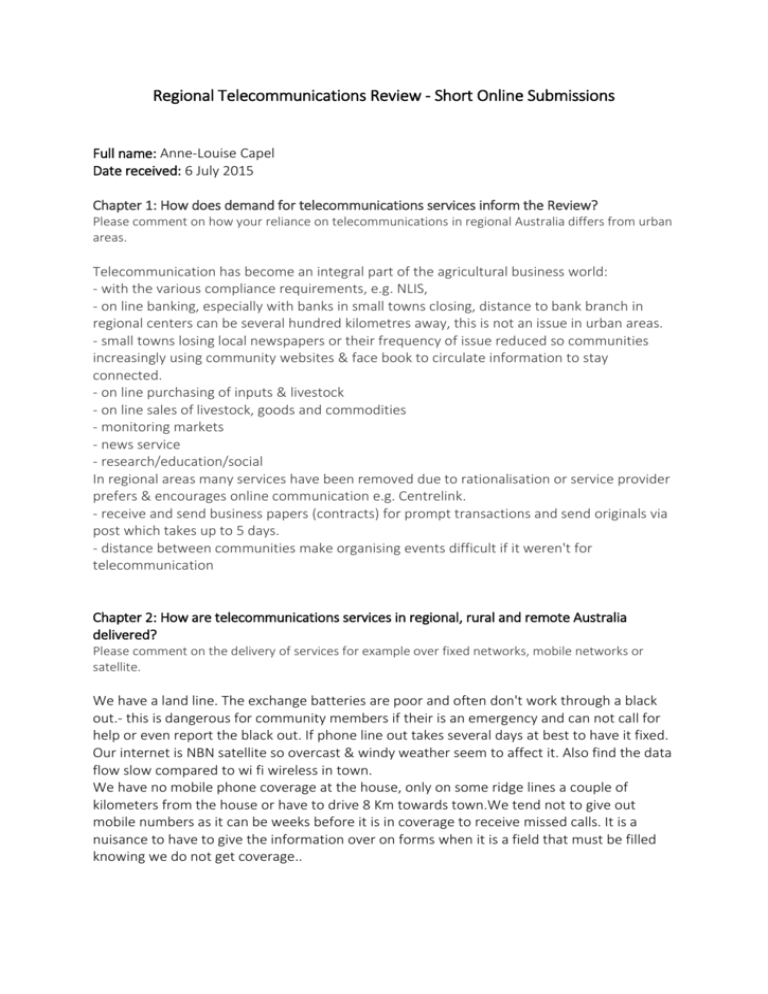
Regional Telecommunications Review - Short Online Submissions Full name: Anne-Louise Capel Date received: 6 July 2015 Chapter 1: How does demand for telecommunications services inform the Review? Please comment on how your reliance on telecommunications in regional Australia differs from urban areas. Telecommunication has become an integral part of the agricultural business world: - with the various compliance requirements, e.g. NLIS, - on line banking, especially with banks in small towns closing, distance to bank branch in regional centers can be several hundred kilometres away, this is not an issue in urban areas. - small towns losing local newspapers or their frequency of issue reduced so communities increasingly using community websites & face book to circulate information to stay connected. - on line purchasing of inputs & livestock - on line sales of livestock, goods and commodities - monitoring markets - news service - research/education/social In regional areas many services have been removed due to rationalisation or service provider prefers & encourages online communication e.g. Centrelink. - receive and send business papers (contracts) for prompt transactions and send originals via post which takes up to 5 days. - distance between communities make organising events difficult if it weren't for telecommunication Chapter 2: How are telecommunications services in regional, rural and remote Australia delivered? Please comment on the delivery of services for example over fixed networks, mobile networks or satellite. We have a land line. The exchange batteries are poor and often don't work through a black out.- this is dangerous for community members if their is an emergency and can not call for help or even report the black out. If phone line out takes several days at best to have it fixed. Our internet is NBN satellite so overcast & windy weather seem to affect it. Also find the data flow slow compared to wi fi wireless in town. We have no mobile phone coverage at the house, only on some ridge lines a couple of kilometers from the house or have to drive 8 Km towards town.We tend not to give out mobile numbers as it can be weeks before it is in coverage to receive missed calls. It is a nuisance to have to give the information over on forms when it is a field that must be filled knowing we do not get coverage.. Chapter 3: How are services being used in regional, rural and remote Australia? Please comment on how telecommunication services are being used for example, interacting with government, education, health or running a business. Technology is revolutionising how business is being conducted. Information in rural areas is slow by post and most small communities don't have even weekly newspapers so for communication with Local Government website, twitter, face book, email etc. have improved information flow between staff, management & Councillors, also Local Govt & community, especially in regional Local Govt areas where years of amalgamation have resulted in Local Govt. areas containing several townships spread over large areas but only 1 or 2 have a local govt. office. Heath for a small community it is vital that our medical practitioners have access to specialists in emergency and telecommunication is vital for this. Education: For many in rural areas distance is a deterrent for continued study. Internet allows this but speeds are too slow in many areas. At least the local High School has an optic fibre connection. it is absolutely vital in remote areas for isolated children being educated to have access to internet. Business - it is vital to have improved internet speeds as more and more business is reliant on the internet, in some cases it is the only way to access the information or service. More businesses sending accounts via email due to cost of postage. Internet becoming important for advertising, product promotion etc. Accessing information incl awards, regulations. Chapter 4: Consumer safeguards Please provide your views on current consumer safeguards and what should be considered in the future. It took 6 years for our phone line to be properly repaired - it was temporarily rigged across trees in the Garden so anytime we had a livestock truck come through someone had to tension the line. - poor service by provider. Batteries at exchange do not last during black outs = this is a safety issue. Lock in contracts should be monitored, providers should also be made to notify existing customers when better deals available (business commonsense doesn't seem to prevail in this area). Repairs to phone lines/ satellite etc should be done promptly as it cost business customer when they don't work. Safeguards so consumers know who are responsible providers not overseas con artists some type of membership/license to operate and abide by regulations. Other comments Please provide any other comments. There are still many black spots in regional areas, especially in hilly terrain and a lack of understanding by urban areas and emergency services that not every one receives SMS on a mobile phone - you can not rely on this in an emergency situation. Multiply telecommunication devices (landline, mobile phone & internet) is expensive.
